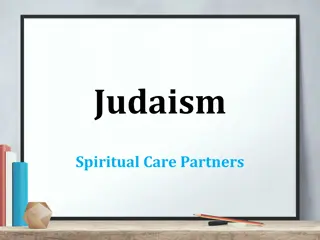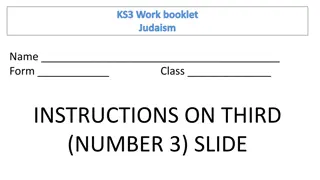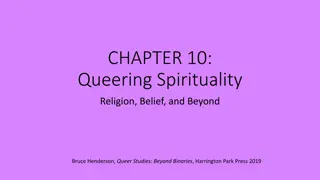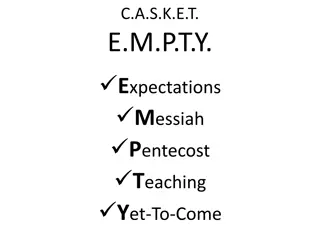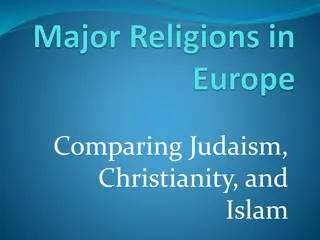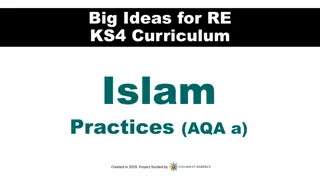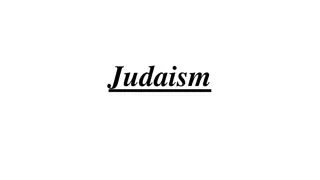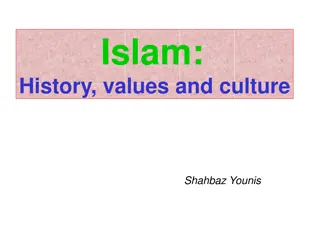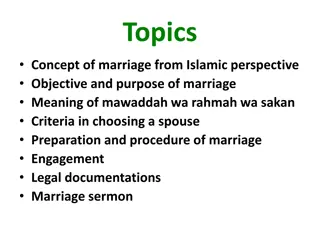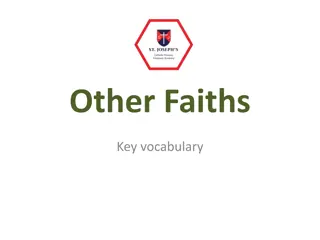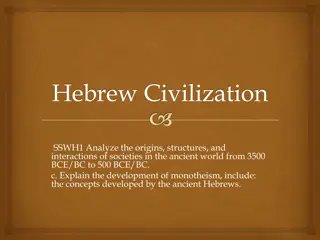Different Faiths: Judaism and Islam
Delve into the traditions and beliefs of Judaism and Islam. Learn about special days, worship practices, stories, and important observances in these two major world religions. Explore the significance of Hanukkah, Passover, and other key events in Judaism, as well as the practices of prayer, fasting, and pilgrimage in Islam. Discover the rich history and cultural practices that shape these faiths.
Download Presentation

Please find below an Image/Link to download the presentation.
The content on the website is provided AS IS for your information and personal use only. It may not be sold, licensed, or shared on other websites without obtaining consent from the author.If you encounter any issues during the download, it is possible that the publisher has removed the file from their server.
You are allowed to download the files provided on this website for personal or commercial use, subject to the condition that they are used lawfully. All files are the property of their respective owners.
The content on the website is provided AS IS for your information and personal use only. It may not be sold, licensed, or shared on other websites without obtaining consent from the author.
E N D
Presentation Transcript
Biblical Principles for Christian Military Service 5 CHRIST-CENTERED, INDUCTIVE BIBLE STUDIES Association for Christian Conferences, Teaching and Service www.accts.org
Purpose These five inductive Bible studies are written as guides for Christians to faithfully serve in the military by: 1) understanding key Christ-centered, biblical texts about military service 2) discussing our Lord s requirements for military service 3) discerning what God requires of us in our military service.
A Brief Introduction to Virtue Ethics Virtues are values, but they are not things they are deliberate actions! Virtues are: defined by how we think, what we believe, and what we do developed by pursuing excellence in life and avoiding what is shameful corrupted by pursuing deficient or excessive courses of action. Military ethics is commonly taught through virtue ethics the imitation of desirable character traits displayed by others (exemplars).
A Brief Introduction to Virtue Ethics (continued) Military members face many ethical and moral challenges throughout their time in service, including: obedience with the chain of command, misuse of government resources, respect/loyalty for others, resolution of conflicting values, cultural differences, political policy, and self vs. organization. In every military and every culture there are many exemplars who demonstrate the essential virtues that lead to military success. Some examples of these military virtues are wisdom, honor, courage, integrity, self-discipline, and loyalty.
Virtue Ethics is Different for Christians! (Part 1) In the military, any example of excellence can be an exemplar of virtue and character. But for Christians, our exemplar is Jesus Christ and the people through whom he reveals Himself to us. Hebrews 12:1-3: Therefore, since we are surrounded by such a great cloud of witnesses, let us throw off everything that hinders and the sin that so easily entangles. And let us run with perseverance the race marked out for us, 2 fixing our eyes on Jesus, the pioneer and perfecter of faith. For the joy set before him he endured the cross, scorning its shame, and sat down at the right hand of the throne of God. 3 Consider him who endured such opposition from sinners, so that you will not grow weary and lose heart. (New International Version) Thus, we live and serve under His new command: John 13:34-35: A new commandment I give you: Love one another. As I have loved you, so you also must love one another. By this everyone will know that you are my disciples, if you love one another (New International Version)
Virtue Ethics is Different for Christians! (Part 2) Jesus is our exemplar. The virtues (actions) that define excellence and well-being for His disciples are different. Hebrews 12:1-3: Therefore, since we are surrounded by such a great cloud of witnesses, let us throw off everything that hinders and the sin that so easily entangles. And let us run with perseverance the race marked out for us, fixing our eyes on Jesus, the pioneer and perfecter of faith. (New International Version) Living these virtues are defined as fruits of the Holy Spirit. Galatians 5:22-23: But the fruit of the Spirit is love, joy, peace, forbearance, kindness, goodness, faithfulness, gentleness and self-control. Against such things there is no law. Those who belong to Christ Jesus have crucified the flesh with its passions and desires. Since we live by the Spirit, let us keep in step with the Spirit. (New International Version) The new commandment to love one another and the fruits of the Holy Spirit redefine human and military virtues.
Virtue Ethics is Different for Christians! (continued) Living these virtues are defined as fruits of the Holy Spirit. Galatians 5:22-23: But the fruit of the Spirit is love, joy, peace, forbearance, kindness, goodness, faithfulness, gentleness and self-control. Against such things there is no law. Those who belong to Christ Jesus have crucified the flesh with its passions and desires. Since we live by the Spirit, let us keep in step with the Spirit. (New International Version) The new commandment to love one another and the fruits of the Holy Spirit redefine human and military virtues.
Inductive Bible Study Process Each of the following five Bible studies begin with a prayer and then focuses on texts from Luke and Acts involving John the Baptizer, Jesus, Peter, and Paul interacting with Roman soldiers. Each Bible study is inductive, with questions to help explore the meaning and application of the biblical text by applying reason, and experiences, and prayer in individual study or group discussion. Each study can be done in one session., or they can be extended into two sessions by using the additional texts for deeper study of the primary text. These additional texts provide examples of similar issues. Each study ends with a prayer using an appropriate Psalm. May these studies bless you and strengthen you in faithful service to our Lord and our nations.
Study 1: What Does God Require of Us? John the Baptizer and the Roman Soldiers Luke 3:14 Introduction This study focuses on values associated with targeting, self-discipline, and endurance under stress. Roman soldiers are watching a crowd and they ask John the Baptizer a question: What does God require of us? John uses three key words to answer the question. The first word literally means, violent robbery or terrify The second word literally means to accuse falsely The third word means to have unfailing strength A fearful, stressed, and discontented soldier is a dangerous soldier to him/herself, to comrades, and to society. Thus, John the Baptizer s answer to the soldiers invites us to consider our levels of unfailing strength under stress, our honesty, and our targeting.
Study 1: What Does God Require of Us? John the Baptizer and the Roman Soldiers Opening Prayer Read Luke 3:1-17 and answer the following questions: What is happening at the river? What different professions are asking John questions? What kinds of questions are they asking? Why do you think answers to these kinds of questions are important for people serving God? How does John s answer apply to individuals or groups? Why? Now focus on Luke 3:14: Do you think the Roman soldiers ask John a different kind of question than the other groups? What is different or similar in their question? What three things does John tell the soldiers? Do you think John is only talking about ethical and spiritual practices involving money? What else can he mean? What do you think the Roman soldiers were expecting John to say? Why didn t John require the soldiers to leave the military? What other miliary activities apply to John s answer? How do we practice proper uses of authority and power? How do we maintain ourselves in times of hardship and fear? Does John s answer apply to individuals or to your units? Why?
Study 1: What Does God Require of Us? John the Baptizer and the Roman Soldiers Now read Luke 13:1 about soldiers behaving wrongly: Where do other people factor into how we measure the consequences of our actions? How do these passages connect with practices of military distinction, necessity, the unnecessary suffering of others, and proportionality? How does John s answer apply to our stewardship of air, sea, land, cyber, and space power? How do Jesus and John s words guide our answers to these questions? Final questions: What are the virtues and values that God requires of those in military service? The four basic principles for targeting in the Law of Armed Conflict are distinction, military necessity, prevention of unnecessary suffering, and proportionality. How do you think John s answer to the Roman soldiers applies to these principles? Do John s final words to the crowd offer any grace to the crowd and to the soldiers? What is this grace? How do the fruits of the Holy Spirit inform John s answer to the soldiers (Galatians 5:22- 23)? What standards do you think God will use for judging our actions as military members? How will the above verses inform your values and practices? Closing Prayer pray together Psalm 62
Study 1: Additional Texts For further study: Read Psalm 62 as a soldier, King David struggled with similar issues as the Roman soldiers. How does his prayer help you answer the following questions? Notice: o Verse 3 situations of improper attacks o Verses 5-8 situations of trust under fire o Verse 10 situations of extortion and misuse of power Read 1 Samuel 24 David spares Saul s life: o What are David s reasons for not killing Saul? (moral values) What are David s orders to his soldiers? (ethical practices) How does this passage relate with John s answer to the Roman soldiers? Read Joshua 2: o David killed Goliath (1 Samuel 17:31-58) and showed the same courage as Joshua (Joshua 1:9). How did the soldiers treat Rahab differently than the rest of their enemies at Jericho? Read Deuteronomy 20. What does God require from Moses and the tribal soldiers in warfare? Why do you think these things are required?
Study 2: For I Myself Am Under Authority Jesus and the Centurion Luke 7:1-10 Introduction This study focuses on the values associated with authority, obedience, loyalty. and care. We do not know the details about the servant s sickness - we only know that this Roman commander was so motivated by his concern for a subordinate that he reached out to a foreigner for help. A Roman centurion commanded 100 soldiers. He was respected by people - the Jewish elders described him as worthy, but he felt unworthy. This Roman commander is the only person in the New Testament whose faith amazed Jesus. Do you think Jesus was more amazed about: his status as a commander, his ethics as a commander, or his faith that Jesus could be a healer? This text demonstrates a characteristic of the military ethos and seems to follow the three primary rules in the chain of command: never make your boss come down to you, what goes up, comes back down, and you can delegate responsibility but never authority.
Study 2: For I Myself am Under Authority Jesus and the Centurion Opening prayer Read Luke 7:1-10 and answer the following questions: Why do you think the centurion sent local elders to Jesus instead of going himself? Why do think they went to Jesus - compulsion, public manners, saving reputation, petitioning for a favor, or something else? How do you think the centurion treated his servant? Military leadership includes our care for subordinates. Why do you think the centurion cared for his servant? Was it to maintain unit end strength, concern for the well-being of a unit member or servant/slave? What other health options were available to the centurion? Why do you think he decided to ask Jesus for healing? Why do you think he believed that he was not worthy to have Jesus come into his home? Why do you think the centurion insisted that Jesus only had to say the word for his servant to be healed? Do you ever feel this way? Why? Why do you think Jesus was amazed by the centurion s behavior? Read Matthew 8:5-13: What are the similarities and differences between Matthew s and Luke s account of this event? How do these similarities and differences help you to understand this text.
Study 2: For I Myself Am Under Authority Jesus and the Centurion Final questions: In his letter to the Romans, Paul writes, For the kingdom of God is not a matter of eating and drinking, but of righteousness, peace and joy in the Holy Spirit, because anyone who serves Christ in this way is pleasing to God and receives human approval. (Romans 14:8) How do the centurion s actions demonstrate Paul s instructions for Christian behavior? He thinks he is unworthy, but Jesus commends his faith do you think Jesus judged him more worthy than he judged himself? Why? How do you evaluate the centurion as a leader? Did he follow his superiors as well as he expected others to follow his orders? What do you think this text says about the virtues of fidelity, responsibility, and accountability in a commander? What do they say about the authority and humility of a leader? Although the centurion wasn t a Christ-follower, did he display attributes that are associated with fruits of the Holy Spirit? Could he have become a believer? What fruits did he display? Do you think they guided his actions as a commander? As members of the military, how can the fruits of the Spirit be a guide for our character? Would you want to serve under this centurion? Why or why not? Closing prayer Pray together Psalm 15
Study 2: Additional Texts Read 2 Samuel 23 about David and his mighty men: o This chapter focuses on the initiative, bravery, and deeds of David s mighty men. They are acting like heroic soldiers. What were they doing? o Focus on verses 13 17. What did they do for David? What did David do? What reason does David for his action? What does this text say about David s virtue as a godly leader? o How are David s actions like the actions of the centurion in Luke 7? How is he acting differently? Read Psalm 15: o How you think this Psalm of David applies to the centurion? o How do you think this psalm applies to our military service?
Study 3: Surely This Man Was Righteous. Jesus and the Centurion at the Cross (Luke 23:44-49) Introduction This study focuses on values of candor, allegiance, self-awareness, and reconciliation. The centurion at that cross was in command of the detail that executed Jesus. Therefore, he was responsible for killing Jesus. It wasn t personal. It wasn t political. He was following orders, Jesus was judged to be an enemy of the State. So, this centurion was doing his duty in leading his soldiers to torture and kill a condemned enemy of the state. Moral injuries happen to warfighters when their actions violate their moral virtues. Conflicting emotions/thoughts reveal their spiritual, psychological, and social struggles. They experience these struggles because they have a conscience. As Christians, we can experience these same struggles because of our faith. These struggles require some type of reconciliation between our moral values and life practice. Do you think the centurion was at peace after carrying out his orders? Why or why not?
Study 3: Surely This Man Was Righteous. Jesus and the Centurion at the Cross Introduction (Part 2) Some warfighters report feeling relief and joy at the end of a battle against an enemy. There is cause to celebrate the death of a perceived evil. Moses and the Israelites celebrated after their enemies died in the Red Sea (Exodus 15), and David celebrated after killing Goliath (1 Samuel 17). But there is also a reason to mourn the death of an innocent victim, to repent, and cleanse ourselves from the consequences of our actions in the performance of our duties (Numbers 31: 1-24). Some say the centurion at the cross was the first Christian because he recognized Jesus as the Son of God (Matthew 27:54, Mark 13:39). We don t know if this centurion became a Christian because he reached the wrong conclusion at the cross. Like the disciples, he didn t know that Jesus would be resurrected, and Luke records the centurion s words differently. After watching how Jesus endured death, the centurion concluded Jesus was right and Rome was wrong. Do you think this meant that he judged his own actions as wrong? Do you think this was a courageous or foolish thing for a soldier to say in public?
Study 3: Surely This Man Was Righteous. Jesus and the Centurion at the Cross Opening prayer Read Luke 23: 44-49 and discuss the following questions: What do you think the centurion saw and did at Jesus execution? We can assume that the centurion was following orders. Would he have evaluated his actions in the same way? What virtues does this centurion exhibit? Do you see any of the fruits of the Spirit at work in this centurion? What are they? Is the centurion s confession the integrity of a bad conscience or an act of faith? How does this he follow or fail to follow John s criteria for soldiers? How is he similar and different from the centurion in Luke 7? Final questions: What role do you think the centurion s candor can have for us? What lessons do you take from this centurion? Where do we draw the line between our military duty and our faithful stewardship? How do the fruits of the Spirit guide you during these times? Have you ever been similar positions to those of the centurion at the cross, or King David before Nathan? What did you do? Closing prayer Pray together Psalm 51
Study 3: Additional Texts Read Numbers 19: What does God command Moses and Aaron to do with soldiers returning from battle? Why does He require soldiers to do this? Do you think this can be a spiritual and psychological cleansing as well as a physical act? What rituals and ceremonies are like this in your context? What do you this has to do with soldiers like the centurion at the cross? Read the story of David, Uriah, and Nathan in 2 Samuel 11 and 12. In the first two Bible studies, David is a good exemplar of godly virtues in a soldier, although he is something different as a king. What happens in these texts? How does David fail as a leader? What restores him? Does David display the same kind of self-assessment as the centurion at the cross? Do the same virtues that he displayed against Goliath, and with his mighty men, now condemn him as a king? David is morally injured by his actions. What does David do when he becomes convicted of deeds? Read Psalm 51. This is David s confession for killing an innocent man. What issues is he talking about? What do you think he is saying? Could this psalm be helpful to the centurion at the cross? How is David changing? What verses describe his changes? Are these verses helpful to you, as you deal with the consequences of your service?
Study 4: We Are All Here in the Presence of God to Listen. Peter and Cornelius (Acts 10:1-48) Introduction This study focus upon values of faith, family, community, and church. This study is different than the other studies because it involves how God uses the personal practices of a centurion named Cornelius and the Apostle Peter to change the spiritual direction of Cornelius, his family, his community, his unit, and the church. Cornelius was saying his personal prayers, and was then willing to gather his family, friends, and his community (which probably including some members from his unit) at God s command. God honored this and used Cornelius as an opportunity to teach Peter and build the church.
Study 4: We Are All Here in the Presence of God to Listen. Peter and Cornelius Opening prayer. Read Acts 10:1-48: What happens in verses 1-8? Cornelius is a Roman - who might he have been praying to? What do you think Cornelius is praying about? How does God respond to the prayers? What is Cornelius reaction? Why does God answer Cornelius prayers? What does the angel tell him? Who does Cornelius trust with the mission? What makes this soldier devout? Focus on verses 9-24: What do you think Peter was praying about? God s answer presented Peter with a problem - what was the problem? How did he respond to God? How did God answer Peter s objection? What three things did he tell Peter to do? Look at verses 19-22. Notice the devout soldiers brought two battle buddies with them. How do the soldiers describe their commander? How does Peter respond?
Study 4: We Are All Here in the Presence of God to Listen. Peter and Cornelius Focus on verses 25-33: How did Cornelius react when Peter showed up at his house? How did Peter respond? Notice verse 27 why was there a large crowd at Cornelius house? Who was in the crowd? In verses 28-34, what does Peter tell Cornelius? Why was he hesitant to go to Cornelius house? Why did he think Cornelius was unacceptable to God? How does Cornelius respond to Peter? What does he want Peter to do? Focus on verses 33-48: How does Peter respond to Cornelius? What does he tell Cornelius that God is doing with them? What does Peter proclaim to the crowd gathered at Cornelius home? What happened after Peter spoke? How did the crowd respond? What did Peter do and say when he witnessed God s actions and the peoples response?
Study 4: We Are All Here in the Presence of God to Listen. Peter and Cornelius Read Psalm 128: How do you think this psalm could be the prayer of Cornelius, Peter, and the church? What is the blessing of God and the peace of Christ that applies to the church? Final questions: How do our families, communities, and units link with military service? How does our faith link with them? How do we practice our spiritual relationship with God while serving in the military? How do you connect your military discipline with your spiritual disciplines? What lessons do we take from these verses? Do you think that Peter and Cornelius are displaying the virtues of a soldier in these texts? What are they? How are they displaying the fruits of the Holy Spirit? Closing prayer Pray together Psalm 128
Study 4: Additional Texts Read 2 Chronicles 20:1-30. Foreign invaders are a threat to God s people. The king includes family members and the close community in a faithful plea to God. Who delivers the people of God from the threat? What lessons do they take from this scripture? Read Acts 11:1-18. God is changing the identity of the community He protects. What do you think is the church s spiritual bias? How does the church react to Peter s ministry with Cornelius? What does Peter tell them? What do they do with Peter s explanation? Read Acts 15:1-22. What God did with Peter and Cornelius, God was doing with Paul and Barnabas. What was God doing? How did the church in Jerusalem react? What did this mean for the future of Christ s church? How is this still happening today? Where do you witness this happening?
Study 5:Everyone Reached Land Safely. Paul and Julius on the Road to Rome (Acts 27) Introduction This study focus upon values of acceptance of risk, purpose, and mission success. In the previous studies, soldiers assumed some type of risk as God entered their lives. How did these soldiers accept risk in talking with John the Baptizer and by changing how they operated? How did the centurion accept risk when he cared enough for a community and for his servant to depend upon a foreign healer? How did the centurion at the cross accept risk when he declared Jesus righteous against the government s charges against him? How did Cornelius accept risk when he became a Christian, and invited others to be baptized with him? How did God accept risk when John, Jesus, and Peter interacted with Roman soldiers on a spiritual level? In 2 Timothy 2:3, the Apostle Paul encouraged a young Christian named Timothy to endure hardships as a good soldier for Christ. He did so for the mission of sharing Christ. In this study we will examine the actions of centurions and Roman leaders who accepted various risks for the purpose of delivering Paul to Rome
Study 5: Everyone Reached Land Safely. Paul and Julius on the Road to Rome Opening prayer. Read Acts 23:12-35. These verses tell the story of a plot to kill Paul. What happens in this passage? What do you think about the actions of the commander? Was it a risk to protect Paul? Was it careerism for him to take credit for uncovering the plot to kill Paul? How can unrighteous motives lead to righteous acts? What do you think about using 200 soldiers for a protection detail? What level of risk did Felix, the commander, and the two centurions accept? Have you experienced anything similar? Read Acts 27. Paul went through two trials in front of Festus and Felix, and was sent to Rome because of his appeal to Caesar. A centurion, Julius, was ordered to take him to Rome. Look at verse 3. What do you think about Julius kindness? How did he accept risk by allowing Paul to stay with friends? Was he a weak soldier? Why did he allow that? Focus on verses 23-41. Their journey was difficult, and they they ran aground in a storm. o What is Paul advising Julius to do? Why is Paul doing this? What does Paul know that Julius doesn t? Why is Julius listening to Paul? o How are they dealing with risk and mission accomplishment?
Study 5:Everyone Reached Land Safely. Paul and Julius on the Road to Rome Read Acts:27:42-44 again. o What did the soldiers want to do to the prisoners? Why did they want to do it? o What did Julius (the commander) do? Why do you think he did this? Was he was acting like the centurion at the cross, Cornelius, and the centurion in Luke 7? How? How do you think he acted in accordance with John s instructions to soldiers in Luke 3? Did he complete his mission? What did God accomplish through Julius actions? Final questions: What do you think of Julius as a soldier? Was he similar to or different from the centurions described in Acts 23? How did he display the virtues described by Aristotle (prudence [self-discipline], justice, fortitude (courage), and temperance (moderation in action)? How did he display actions which are associated with the fruits of the Holy Spirit (Galatians 5:22-23)? How will you use Julius example in your military service? Closing prayer -- pray together Psalm 144. Do you think this could be the prayer of Julius, Paul, Stephen, Philemon, and Onesimus? How can it be your prayer?
Study 5: Additional Texts Read Acts 7 and Acts 8:1 - What happened to Stephen? Why did Paul approve? Read Galatian 1:11-14 later in his life, Paul reflects about what he did. What did he learn? Did the Roman leaders (Acts 23-26) and Julius act with more mercy than Paul? Why? Read Philemon. Why is Paul sending Onesimus back to Philemon? What risks are Philemon, Onesimus, and Paul taking? What are they accomplishing? How is this similar or different from the risks that Peter and Cornelius took in Acts 15? (Note: The first recorded bishop of the church in Ephesus is Onesimus. What do you think happened?) Read Ephesians 6:10-18. How do these verses apply to Julius, Paul, Stephen, Philemon, and Onesimus? How do they apply to Christians at risk? How do they apply in your service?
Conclusion As Christians we do not have the option of separating our personal faith from the work we do. We have a relationship with God based on His grace and not our works (Ephesians 2:8-10). However, we also cannot separate the content of our faith from the works we perform (James 2:17). Thus, our moral duties must be consistent with our ethical practices. Any military virtue we profess and any military duty we perform must be in service to our Lord s new commandment (John 13:34-35), and the guidance of the Holy Spirit who energizes (1 Corinthians 12:3) and produces the fruits that guide our life practices (Galatians 5: 22-23). The temptations and trials of ancient soldiers are not totally different from the struggles we face today. There will be those times when we are tempted and distressed, and our character as members of the military seems contrary to our character as Christians. It may even seem impossible to act with integrity. Yet, with man this is impossible, but with God all things are possible (Matthew 19:26). Let these contacts between Roman soldiers with Jesus, John, Peter, and Paul be guides for us, as God draws us close to us in our military service.
Conclusion (continued) The temptations and trials of ancient soldiers are not totally different from the struggles we face today. There will be times when we are tempted and distressed, and our character as members of the military seems contrary to our character as Christians. It may even seem impossible to act with integrity. Yet, with man this is impossible, but with God all things are possible. (Matthew 19:26) Let these contacts between Roman soldiers with Jesus, John, Peter, and Paul be guides for us, as God draws us close to us in our military service.



